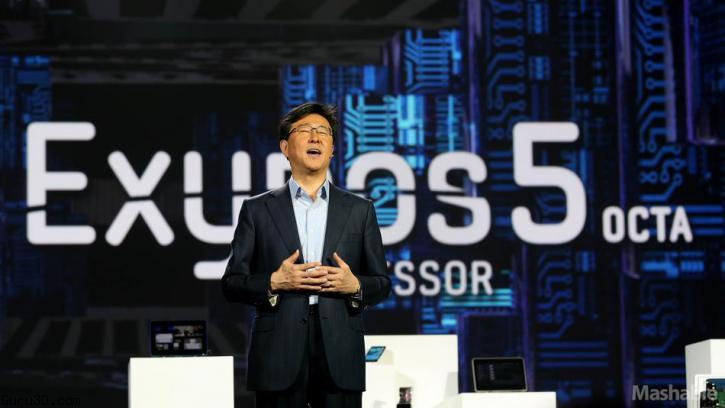Samsung is announcing a new 8-core processor, but it's not quite what you'd think. It's better, reports the verge. The new silicon is called the Exynos 5 Octa, and it uses ARM's new big.LITTLE processor technology. The processor design switches between two clusters of four cores each: ARM Cortex-A15 for performance, and Cortex-A7 to handle common workloads while providing better battery life. Samsung said it is focusing on three areas: processing, memory and display technology.
This isn't even the first chip to use separate cores for heavy and light workloads. But Samsung says that it can cut power consumption by up to 70 percent compared to the Exynos 5 Dual by being able to tackle common jobs with the lower-voltage A7 cores, which means — far more than the Exynos 5 Dual — we could see it fit inside smartphones. And since it has four Cortex-A15 cores, the Exynos 5 Octa stands to outclass that existing Exynos 5 Dual, the dual-core-A15 processor found in the Nexus 10 — already an extremely fast chip — and Samsung says it provides twice the 3D performance of any previous mobile processor, including the company's Exynos 4 Quad.
Samsung’s Exynos 5 Octa is comprised of two sets of four cores: ARM Cortex-A15 and and Cortex-A7, and is said to lower power consumption by up to 70 percent compared to the Exynos 5 Dual.
The Exynos 5 Octa is expected to be made available in high-end smartphones as it is expected to make multitasking on mobile devices a smoother experience as there should be no stuttering when playing HD videos. The Exynos 5 Octa also has twice the 3D performance of any of Samsung’s previous mobile processors and is the first mobile processor to implement ARM’s big.LITTLE technology. So what does all of this mean to you, the average and above-average mobile-device user? Simple – expect your mobile devices to get some serious speed and 3D graphic improvements if it’s built with the Exynos 5 Octa.
We're definitely looking forward to seeing if Samsung can deliver better battery life and better performance (if not simultaneously) in the next generation.
If this goes into the Galaxy S4, daaaamn.


